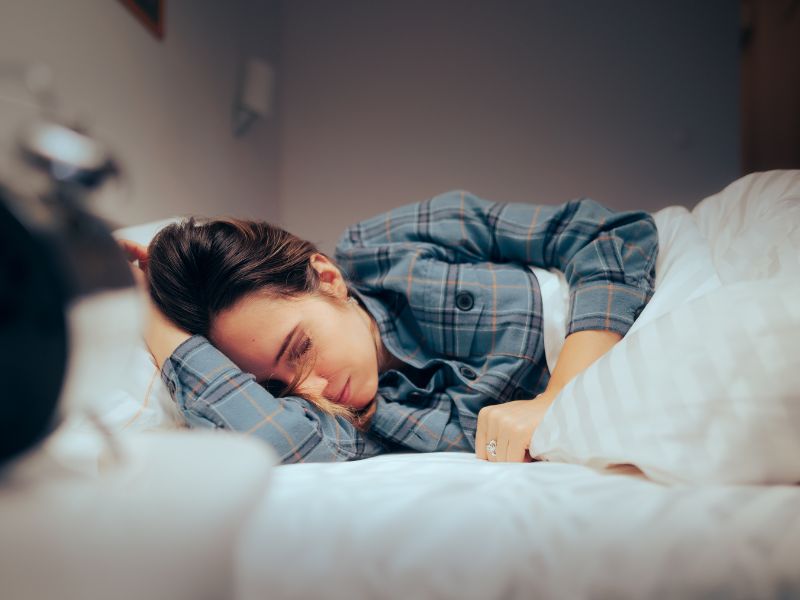Menopause fatigue – a huge topic online. It’s definitely a shock to the system for more people than you.
What happened to you? One day you felt great! You were riding high, enjoying yourself, reaping the rewards of having several decades under your belt, and then one day…kaplop. Your energy dropped.
It didn’t just drop. It crashed to a frighteningly low bottom. You thought it was just temporary, maybe your immune system fighting off a little bug – or you just overdid it a little too much at work.
Now, fast forward to today. You still feel like a truck hit you. The fatigue hasn’t gone away. And now you’re afraid it never will, and that you’re going to have to live like this forever.
We have good news! If you are a woman in her 40s or early 50s, then it might just be menopause.
Is Fatigue a Sign of Menopause?
Menopause comes as a shock to some. People typically associate symptoms like hot flashes and night sweats with menopause, but there are many other symptoms that come along with this massive hormone shift. One of those is fatigue.
Fatigue: Feeling overtired, with low energy and a strong desire to sleep that interferes with regular daily activities.
Sound familiar?
Menopause fatigue is constant and severe and can affect your quality of life, but there are ways to prevent fatigue or restore your energy.
We’ll get to some tips in a bit. First, let’s look at the science around menopause fatigue.
Menopause and Fatigue
Fatigue during menopause can be caused by a combination of factors. The source of those factors is almost always hormone imbalance. Menopause is the time of life when your fertility comes to an end. That means that your body stops producing eggs.
This doesn’t just happen all at once. It’s not as if a production line is suddenly switched off. The way your body stops the production of eggs is that it starts slowing down the production of sex hormones and eventually ends it entirely. Since all of our hormones are interdependent upon each other, when one hormone level decreases or increases, it affects a whole lot of other hormones. Eventually, your body stops producing estrogen altogether. At that point, your periods have come to a halt, and you’re no longer fertile.
So what makes you tired?
Hormones like estrogen, progesterone, thyroid hormones, and adrenal hormones regulate cellular energy. When their levels change, it can make you feel exhausted for no discernible reason.
Changes in hormone levels can also cause insomnia or sleep disruptions like night sweats, hot flashes, and a frequent need to urinate.
The science is easy here: Lack of sleep obviously leads to a feeling of tiredness and lack of energy.
Let’s get to the good stuff!
How to Combat Fatigue During Menopause
The bad news is that you could be having menopause symptoms for years. It can take that long for the body to cease estrogen and egg production. The great news is that once that happens, most women are in the clear! Until that time, we recommend taking the following steps to manage your fatigue.
1 Let’s get Physical!
It may sound counterintuitive, but exercise is one of the best solutions for fatigue. A 2015 study found that moderate- to high-intensity exercise in postmenopausal women is associated with higher energy levels. Don’t make it a chore. If you do something you enjoy and keep it simple, exercise will turn into a habit.
2 Rock-a-Bye Baby
A good sleep routine can fix so many woes including low energy and fatigue. Get into the habit of going to bed and waking up around the same time every day. Avoid caffeine, alcohol, smartphones, TV, and computers close to bedtime.
3 Become a Meditation Maven
Stress. Do we have to say more? Stress is the underlying cause of many conditions. But it isn’t always the stress that’s the problem. It’s how you respond to stress. Beat stress by meditating. You don’t have to do it perfectly or for long periods of time for results. If you’re a mover and a shaker, try yin yoga or tai chi.
4 Cool Off, Cutie
You can’t control everything, but you can turn down the thermostat. Keep your bedroom cool enough to accommodate your body’s natural temperature fluctuations during the night. Many experts say the ideal temperature for a good night’s sleep is around 65˚F (18˚C).
5 Downsize, Darling!
Eating a big dinner right before bedtime can leave you feeling too full to sleep. Heavy meals can also keep you up all night, suffering from heartburn. Eat smaller portions of nutrient-dense foods to get your body moving and snoozing when it should be.
6 Boost it With BHRT
Bio-Identical Hormone Replacement Therapy is a very effective way to treat the root cause of menopause fatigue, hormone imbalance.
How You Will Know it’s Menopause Fatigue
In addition to fatigue, do you have any of these other symptoms?
- Irregular periods
- Weight gain
- Mood swings
- Night sweats
- Hot flashes
- Trouble sleeping
- Vaginal dryness
Then you’re probably going through menopause. A good healthcare provider can diagnose the condition and develop a treatment plan to help relieve the symptoms to make this life transition a whole lot easier.
Nava Health Knows What Helps with Menopause Fatigue
Menopause is a natural process, but you don’t have to suffer through the symptoms until they finally disappear on their own. These symptoms have a serious impact on living your life to the fullest. At Nava, we have developed a strategy that can help address these conditions by restoring hormone levels that have become imbalanced or depleted due to menopause, stress, or an underlying health condition.
By thoroughly evaluating your overall hormone function, a Nava bioidentical hormone physician can assess the source of your hormone imbalance or deficiency – essential information to know before they make any recommendation for you.
Nava’s Hormone Optimization Therapy is unique because it’s not limited to Bioidentical Hormones but also provides Adrenal Recharge therapy and Thyroid Balance programs.
Nava’s Bioidentical Hormone Replacement Therapy, administered by a Nava practitioner, may be able to help you recapture the balance and energy of youth instead of you settling for the effects of aging.
Give us a call now and let’s arrange a consultation that will help change things up for you.



